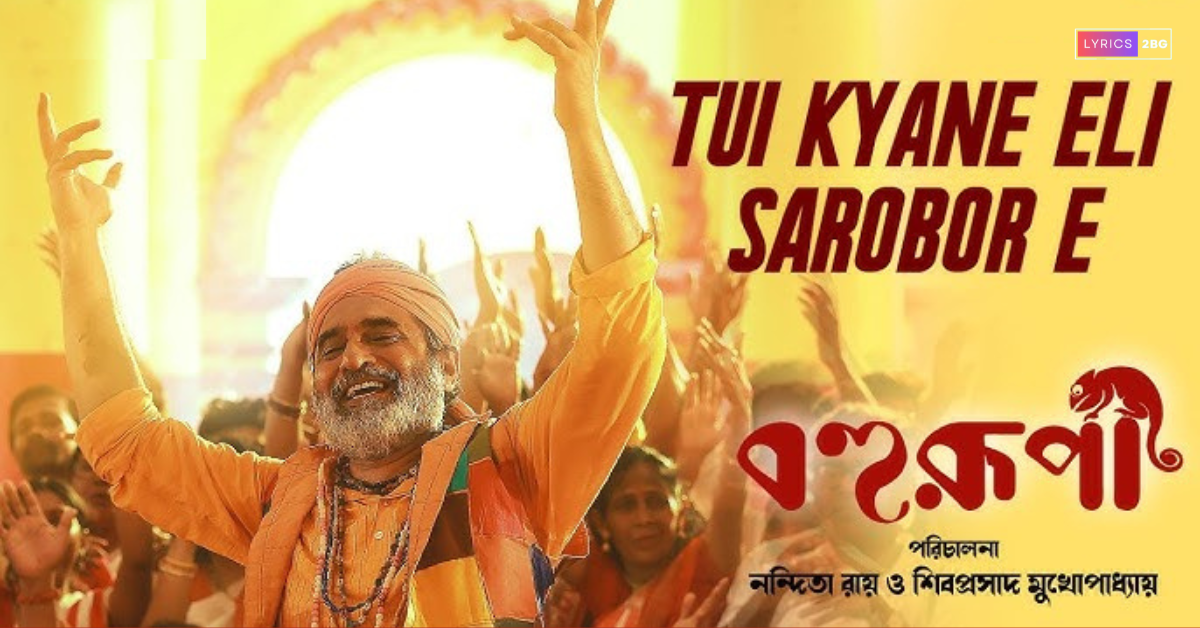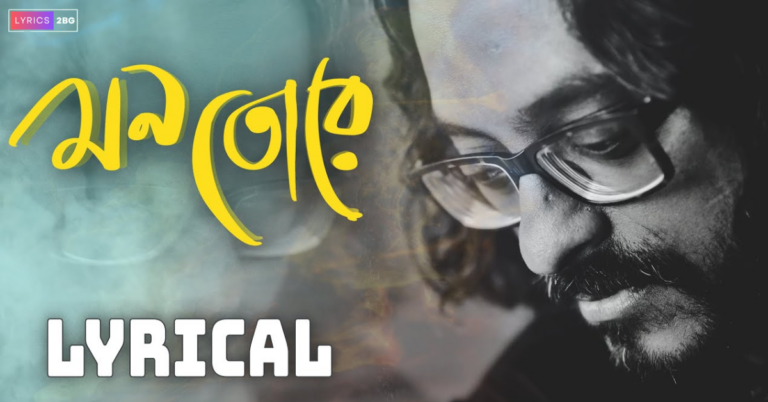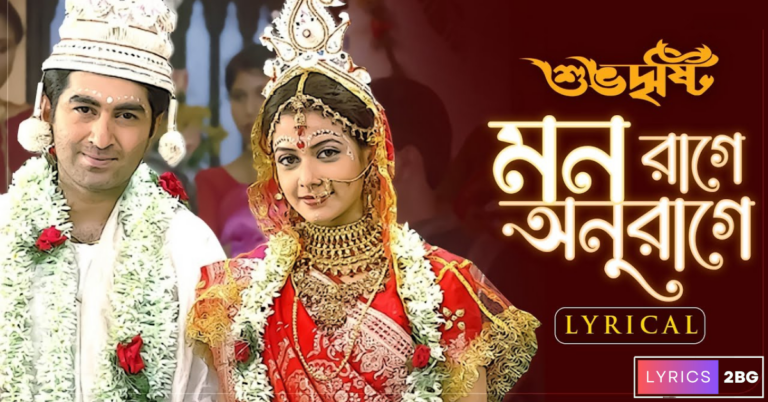Tui Kyane Eli Sarobore Lyrics | তুই কেনে এলি | Silajit Majumdar
Tui Kyane Eli Sarobore Lyrics
ও তুই কেনে এলি
ও তুই কেনে এলি সরোবরে,
ও-তুই কেনে এলি, কেনে এলি,
কেনে এলি রে?
তুই কেনে এলি সরোবরে বেহুলা সুন্দরী
তুই কেনে এলি সরোবরে বেহুলা সুন্দরী।
তোর পায়ের জল মোর গায়ে পড়িল
তোর পায়ের জল মোর গায়ে পড়িল
আমি বিষহরি,
তুই কেনে এলি সরোবরে বেহুলা সুন্দরী
তুই কেনে এলি সরোবরে বেহুলা সুন্দরী।
জগৎ জুড়ে জাল ফেলেছি
জালে ধরি মায়া,
জগৎ জুড়ে জাল ফেলেছি
জালে ধরি মায়া,
জীবন খোঁজে আর এক জীবন
আঁধার খোঁজে ছায়া,
ফল ধরে পোয়াতি গাছে
মেঘে ধরে জল,
জন্মিলে মরিতে হবে, সবারে
তবু কোলাহল খ্যাপা,
তবু কোলাহল, তবু কোলাহল।
পরের জমি ভাবলি নিজের
হাওয়ায় বেঁধে ঘর,
ধরতে যদি পারিস তবে
অধরা কে ধর রে খ্যাপা,
অধরা কে ধর।
ও.. অধরা-কে-ধর
তুই কেনে এলি সরোবরে বেহুলা সুন্দরী,
তোর বাসর ঘরে, হে হে
তোর বাসর ঘরে মরবে পতি
হবি কোড়ের হাঁড়ি,
তোর বাসর ঘরে মরবে পতি
হবি কোড়ের হাঁড়ি,
তুই কেনে এলি?
তুই কেনে এলি সরোবরে বেহুলা সুন্দরী।
চামের খাঁচায় ধরে মাংস রক্ত হাড়
পাপ ছাড়ে না বাপ কে,
বিধাতার মার খ্যাপা, বিধাতার মার।
যতই বানাক বিশ্বকর্মা
ইস্পাতেরই বাসর,
এক ছামড়াতে এক ছোবলে
মরবে লক্ষিন্দর ব্যাটা,
মরবে লক্ষিন্দর, মরবে লক্ষিন্দর।
পরের জমি ভাবলি নিজের
হাওয়ায় বেঁধে ঘর,
ধরতে যদি পারিস
অধরা কে ধর রে ধর,
অধরা কে ধর।
তুই কেনে এলি সরোবরে বেহুলা সুন্দরী
তুই কেনে এলি সরবরে বেহুলা সুন্দরী।
Meaning of Tui Kyane Eli Sarobore Lyrics
Tui kyane eli sarobore lyrics shared is a deeply philosophical and evocative Bengali composition that seems to blend themes of love, fate, existential contemplation, and the inevitable cycle of life and death. It centers around the figure of Behula, a mythological character from Bengali folklore, who is often portrayed as the epitome of love and devotion. However, this song transforms the image of Behula into a symbol of the complex, inescapable forces of life.
Tui kyane eli sarobore lyrics line “তুই কেনে এলি সরোবরে বেহুলা সুন্দরী” (“Why have you come, Behula, the beautiful one, to the lake?”) reflects a sense of wonder and perhaps a question of fate—why and how does life unfold the way it does, particularly the tragic love story of Behula and her husband, Lakshindar, whose life is cut short by a snakebite. The lake (or “sarobor”) symbolizes a space of transition, a boundary between life and death, or perhaps the realm where desires, dreams, and existential questions collide.
The phrase “তোর পায়ের জল মোর গায়ে পড়িল” (“The water from your feet has fallen on me”) can be interpreted as the speaker feeling an involuntary connection with Behula, as though touched by destiny or the weight of her sorrow. The water could symbolize the purity and devotion of Behula’s love, but it also represents the burden of fate, which the speaker cannot avoid.

Tui kyane eli sarobore lyrics lines “জগৎ জুড়ে জাল ফেলেছি, জালে ধরি মায়া” (“I have cast a net across the world, and I catch illusions in it”) suggest that the speaker is engaged in the human struggle to make sense of life. The “net” can symbolize the human condition—our attempts to capture or hold onto fleeting moments, desires, or illusions. The word “māyā” (illusion) ties into Hindu and Buddhist philosophies, where the material world is seen as transient and deceptive. The net here represents a futile attempt to hold onto transient things like love, life, or meaning.
As the song progresses, it expands on themes of life and death with lines like “জন্মিলে মরিতে হবে, সবারে তবু কোলাহল খ্যাপা” (“One must die after being born, yet there is chaos everywhere, insane”). Tui kyane eli sarobore lyrics lines convey the inevitability of death, yet humans remain consumed by noise, desires, and chaos in life, as though they are unaware of their own mortality. This creates a paradox: while death is inevitable, people often live as if they are invincible, distracted by the trivialities of life.
Tui kyane eli sarobore lyrics metaphor of “পরের জমি ভাবলি নিজের, হাওয়ায় বেঁধে ঘর” (“You thought someone else’s land was your own, and tied your house in the wind”) suggests the human arrogance or ignorance of trying to control or claim what is not truly ours—whether it’s land, wealth, or even life itself. The wind is a symbol of the uncontrollable forces in the universe, highlighting the futility of trying to anchor oneself to something that is essentially fleeting or not meant to be possessed.

Tui kyane eli sarobore lyrics later lines introduce the harshness of fate, with “চামের খাঁচায় ধরে মাংস রক্ত হাড়, পাপ ছাড়ে না বাপ কে” (“In the cage of bones and flesh, the sin does not leave the father”). This imagery portrays the relentless grip of fate, with even the most primal parts of existence—our flesh, blood, and sin—being inescapable. No matter how much one tries to control their destiny, they remain subject to the greater forces of the universe, which are beyond human comprehension or manipulation.
Tui kyane eli sarobore lyrics references the mythological character Lakshindar and his tragic fate—he is destined to die by snakebite, as he is tricked by fate. “মরবে লক্ষিন্দর, মরবে লক্ষিন্দর” (“Lakshindar will die, Lakshindar will die”) reinforces the inevitability of death. The lines suggest that no matter how much one tries to escape fate or understand life, some things, like death and destiny, are beyond human control. The repetition of “Adhara ke dhor” (“catch the unattainable”) further echoes the futility of trying to grasp what is beyond reach, whether it’s understanding life, controlling fate, or capturing eternal love.
In essence, this song is a poetic meditation on the illusions and contradictions of life, love, and fate. Through the figure of Behula, it reflects on the struggle between the transient nature of existence and the human desire to find meaning, control, and permanence in a world ruled by the unstoppable forces of destiny. It also asks questions about love and sacrifice, fate and freedom, reminding us of the limits of human agency in the face of a universe that moves to its own rhythm.
About the Author of the Song
Tui kyane eli sarobore is a bengali climax song is sung by Silajit Majumdar and Sukanya Chattopadhyay from Bohurupi bengali movie. Tui kyane eli sarobore lyrics was written by Silajit Majumdar and extracts from Manasa Mongol. Bohurupi bengali film directed by Nandita Roy and Shiboprosad Mukherjee.
Song : Tui Kyane Eli Sarobore Lyrics
Film : Bohurupi
Singers : Silajit Majumdar and Sukanya Chattopadhyay
Composition : Silajit Majumdar
Lyrics : Silajit Majumdar and Extracts from Manasa Mongol
Arrangement and Programming : Prabuddha Banerjee
Recorded by : Gautam Basu
Mixed and Mastered by : Tirthankar Majumdar
Direction : Nandita Roy and Shiboprosad Mukherjee
Cinematography : Indranath Marick
Produced by : Windows






